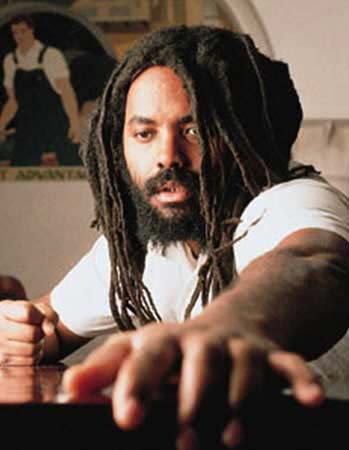Justice Matters
Despite Judge Order, Are There Roadblocks to Justice For Mumia?

Noelle Hanrahan, Esq.
Prisondio Co-Director
We are locked in conflict up on the 8th floor of the Common Pleas Courthouse in Philadelphia, arguing over guilt, innocence and 41 years of unjust imprisonment.
We know that love is only here because Mumia Abu Jamal survived being shot in the chest as he ran across a street to help both his brother and Daniel Faulkner. On December 9th 1981, when police critically wounded Mumia Abu-Jamal, and someone else fatally shot police officer Danny Faulkner, two large and loving families were torn apart.
In the Courtroom on December 16th, 2022
In a shocking reprieve, Judge Lucretia Clemons ordered the District Attorney to open up all of their files to Mumia Abu-Jamal’s defense team. Judge Clemons, stayed for the moment, her “intent to dismiss” notice. She stated she would rule in 60-90 days on Mumia’s request for a new trial.
Speaking directly to all parties from the bench, she said “I do not want to return to this issue again. I want, once and for all, to resolve all of these questions.”
Prior to her surprising directive, which occurred at the very close of a contentious hearing, there had been no indication that Judge Clemons would be sympathetic to granting relief. Her questions regarding the “Batson Claim”, specifically notes taken by prosecutor Joseph McGill during the original trial, in which he actively tracked the race of prospective jurors, did not recognize the very basis of Batson v. Kentucky. Striking even one juror because of a racial consideration violates the potential jurors’ rights and the defendant’s constitutional rights. She seemed to assume, despite evidence to the contrary, that the DA’s office in 1982 was color blind and had no animus. She also did not waiver from her written decision on the “Brady Issue” that the two main prosecutor’s “eyewitnesses” even if they did lie, was not necessary, “not material” for the conviction. Meaning even Despite evidence to the contrary, she seemed to assume that information would not have impacted the deliberations of even one juror. During arguments Judge Clemons did not probe prosecutor Grady Gervino’s mischaracterizations of the law and the record. She did address or expose his omissions. Clemons simply chose not to challenge him at all.
Thus, the reason for Judge Clemons’ expansive discovery order is ripe for speculation. She implied that allowing a complete review of prosecution files would resolve any and all issues of potential suppressed evidence, thus, in her mind, finally closing the door on the case and allowing her to wrap it up.
The problem with that theory is that if you frame someone for murder, it is hard to cover up all the loose ends. It makes one wonder: does Judge Clemons truly understand the depth and widespread corruption of the Philadelphia police department and the former DA’s office? The police and former prosecutors acted with complete impunity for decades. They are proud to be the sons of Rizzo, and they certainly did not care about a defendant’s constitutional rights. See this Assistant District Attorney Jack McMahon prosecution training tape about removing Black people from Philadelphia Juries!
The current District Attorney’s office knows and will admit (just not in open court) that the police for decades routinely brutally beat victims and witnesses and manufactured false confessions. The police suppressed evidence of innocence, fixed crime scenes, raped informants, robbed bodegas, paid witnesses for testimony, planted evidence, and were on the take. This was on the front page of Saturday’s Inquirer, top of the fold.
Philadelphia prosecutors and the courts did not just turn a blind eye; they colluded and continue to collude with the police to maintain convictions of a generation of poor black and brown people in Philadelphia. Police and prosecutorial corruption in Philadelphia is no secret. In this case, the byzantine rules of the post-conviction relief act (PCRA) have already kept key evidence* from being in the record before Judge Clemon.** Now the question remains did “district attorney McGill and the detectives keep additional notes that reveal corruption”?
When you frame someone, it is super hard to put all of that back into the police and prosecutor’s Pandora’s Box. Will the police turn over to the defense the actual “Homicide File”? They often, in many homicide cases, turn over police files as well, so why not this one? What is to hide?
The courts and lawyers are only one part of what it takes to realize justice. Equally important is the ability to connect with the hearts of those who will join us in the quest to bring Mumia Abu-Jamal home to his family. That is our job.
In the coming days, we will bring you details of an amazing week of outstanding grassroots activism, including hundreds of letters from France and the U.S. supporting Love Not Phear, Julia Wright’s prophetic letter and organizing, and Democracy Now’s coverage of the story featuring Judge Wendell Griffen Division 5 Judge of the Sixth Circuit, for Pulaski County in Arkansas. Author of Justice for Both Maureen Faulkner and Mumia Abu-Jamal.
Join us.
Cuando luchamos ganamos, When We Fight, We Win
Noelle Hanrahan is the director of Prison Radio, a multimedia production studio that brings to the public the voices of incarcerated women, men and children. She seeks to honor the agency and humanity of prisoners by bringing their uncensored essays into mainstream discourse.

